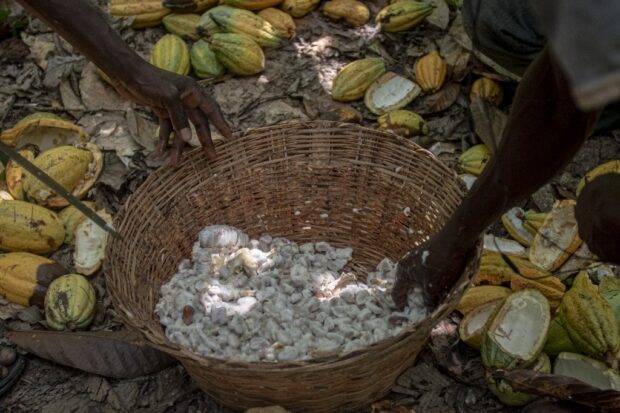Ghana raises cocoa price by 45% to deter smuggling

(FILES) Detail of recently extracted cocoa beans in a farm in Asikasu on December 19, 2020. Despite government efforts to stabilize the sector and recent soaring global cocoa prices, many Ghana farmers say they feel abandoned and have turned to illicit trade to survive in the world’s No. 2 producer. Ghana is emerging from one of it worst economic crisis in years after securing a $3 billion credit from the International Monetary Fund and restructuring most of its debt. (Photo by CRISTINA ALDEHUELA / AFP)
Accra, Ghana — Ghana’s government on Wednesday announced a 45-percent increase in the producer price of cocoa for the 2024/2025 crop season, in a bid to curb smuggling.
The policy is also designed to improve the welfare of cocoa farmers as the new season begins, said Agriculture Minister Bryan Acheampong.
The new price, effective from Wednesday, raises the payment for a 64-kilogram bag of cocoa beans to $192, up from $132.
READ: Ghana’s cocoa farmers turn to smuggling as currency falls
That brings the farm gate price to $3,063 per tonne, a 129-percent increase from the opening price of $1,335 per tonne for the 2023/2024 season.
“This is an unprecedented increase of 129.36 percent,” Acheampong said as he announced the increase Wednesday.
“This appreciable increment in the producer price of cocoa signifies the government’s commitment to improve the sector and the livelihoods of the Ghanaian cocoa farmer.”
The price rise follows a mid-season adjustment last year when the government raised prices from $1,335 per tonne to $2,113 per tonne in response to soaring international cocoa prices.
New York cocoa futures have recently surged above $7,000 per tonne due to poor harvests in Ghana and Ivory Coast, the world’s top producers.
Farmers in these countries however often receive much lower prices, set by their governments.
READ: Who profits from the soaring price of cocoa?
Experts suggest that increasing the farm gate price could lower the incentive for illegal cross-border sales, allowing farmers to reinvest in their cocoa farms, thus potentially easing the global supply shortfall.
Ghana’s cocoa harvest has declined in recent years due to weather challenges, disease, inadequate inputs, and smuggling.
Its cocoa sector, which accounts for about 10 percent of the nation’s GDP, relies heavily on smallholder farmers.
But the depreciation of the cedi, which has lost over 20 percent of its value against the dollar this year, has further squeezed farmers’ margins — even though international prices reached $10,000 per tonne in March before retreating.
Production costs have also soared, with fertilizers and other essential materials becoming increasingly expensive, while poor road networks have pushed up transport costs.
The sector has also had to contend with the Cocoa Swollen Shoot Virus Disease, which has devastated nearly 500,000 hectares of cocoa farms in recent years. That represents about 29 percent of Ghana’s total cocoa production area.